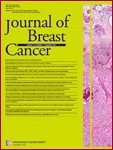
Journal of Breast Cancer
Scope & Guideline
Fostering Global Collaboration in Breast Cancer Studies
Introduction
Aims and Scopes
- Clinical Research in Breast Cancer Treatments:
The journal emphasizes clinical studies that explore various treatment modalities for breast cancer, including chemotherapy, targeted therapies, and surgical interventions. - Molecular and Genetic Studies:
There is a strong focus on the molecular and genetic underpinnings of breast cancer, investigating biomarkers, genetic mutations, and their implications for prognosis and treatment. - Immunology and Biomarkers:
Research on immunological aspects and the identification of biomarkers linked to breast cancer progression and treatment responses is a recurring theme. - Patient-Centered Care and Quality of Life:
The journal also prioritizes studies that address the psychosocial aspects of breast cancer, including patient empowerment, quality of life, and the impact of socio-demographic factors. - Technological Innovations in Diagnosis:
The journal features advancements in diagnostic technologies, including imaging innovations and the role of artificial intelligence in breast cancer detection.
Trending and Emerging
- Targeted and Personalized Therapies:
Recent publications have increasingly focused on the development and application of targeted therapies, including studies on HER2-low breast cancer and the use of specific genetic markers to tailor treatments. - Role of Immunotherapy:
There is a growing interest in the role of immunotherapy in breast cancer management, as evidenced by research exploring tumor-infiltrating lymphocytes and other immune-related factors. - Psychosocial Factors in Breast Cancer Care:
Emerging studies are highlighting the importance of psychosocial support and the impact of mental health on treatment outcomes, indicating a shift towards a more holistic approach in breast cancer management. - Innovative Diagnostic Techniques:
The journal has seen a rise in articles exploring innovative diagnostic methods, such as advanced imaging techniques and the use of artificial intelligence, to improve early detection and treatment planning. - Impact of Comorbidities on Breast Cancer Outcomes:
There is an increasing focus on how comorbid conditions, such as depression and other chronic diseases, affect breast cancer prognosis and treatment, underscoring the complexity of patient care.
Declining or Waning
- Traditional Chemotherapy Protocols:
There has been a noticeable decrease in studies focusing solely on traditional chemotherapy regimens, as research increasingly shifts towards personalized medicine and novel therapeutic agents. - Epidemiological Studies of Breast Cancer Incidence:
Epidemiological research that solely focuses on breast cancer incidence rates and general risk factors appears to be waning, potentially due to a shift towards more targeted studies that explore specific populations or genetic factors. - Basic Science Research without Clinical Application:
There is a trend away from basic laboratory studies that do not translate into clinical applications, as there is a growing emphasis on translational research that links laboratory findings to patient care.
Similar Journals
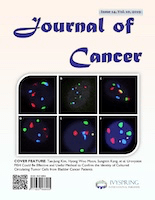
Journal of Cancer
Pioneering discoveries in the realm of oncology.Journal of Cancer is a premier, peer-reviewed academic journal published by IVYSPRING INTERNATIONAL PUBLISHING that focuses on advancing the field of oncology. With an impact factor reflecting its significant contributions, this journal ranks in the 80th percentile of medical journals pertaining to oncology, positioning it at #79 out of 404 in Scopus. Since its inception in 2010, the journal has embraced an Open Access model, ensuring that groundbreaking research reaches a global audience without barriers. Based in Australia, the journal addresses a wide array of topics within cancer research, catering to researchers, healthcare professionals, and students committed to enhancing their understanding of the complexities of cancer. Amidst evolving challenges in oncology, the Journal of Cancer serves as a vital platform for disseminating innovative findings, fostering collaboration, and promoting informed decisions that can lead to improved cancer outcomes worldwide.
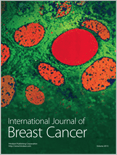
International Journal of Breast Cancer
Championing open access to breast cancer discoveries.The International Journal of Breast Cancer is a premier academic platform dedicated to advancing the field of breast cancer research and treatment. Published by HINDAWI LTD, this journal embraces an Open Access model since 2011, ensuring that cutting-edge research is readily accessible to all, facilitating the dissemination of knowledge across the global scientific community. With its ISSN 2090-3170 and E-ISSN 2090-3189, the journal caters to a diverse audience comprising researchers, clinicians, and students engaged in oncology and pharmacology. The journal has consistently demonstrated its relevance, classified in the Q4 quartile for Cancer Research and the Q3 quartile for both Oncology and Pharmacology in the latest rankings. It currently ranks #151/272 in the Medicine & Pharmacology category and #232/404 in Medicine & Oncology according to Scopus, showcasing its adaptive role in an evolving field. Commencing in 2013 and continuing through to 2024, the journal is positioned to be an essential resource, addressing critical topics and fostering innovative solutions for breast cancer challenges.

Cancer Management and Research
Empowering healthcare professionals with cutting-edge findings.Cancer Management and Research, published by DOVE MEDICAL PRESS LTD, is a leading open-access journal dedicated to advancing the field of oncology. Since its inception in 2009, this journal has established itself as a vital resource for researchers, clinicians, and healthcare professionals focused on cancer treatment and management. With its robust impact factor and impressive Scopus ranking in the 77th percentile of oncology medicine, it provides a prominent platform for sharing high-quality research. The journal covers a wide range of topics within cancer management, including innovative therapeutic strategies, clinical trials, patient care, and health policy, ensuring a comprehensive approach to current challenges in the field. Operating from New Zealand, it invites contributions that can shape the future of oncology and improve patient outcomes globally, making it an essential addition to the libraries of those engaged in cancer research and practice.

Breast Cancer
Innovating treatment strategies for better patient outcomes.Breast Cancer is a prestigious peer-reviewed journal published by SPRINGER JAPAN KK, specializing in the multifaceted domains of oncology and medical pharmacology. With an impressive impact factor and recognized within the Q1 category in multiple areas, including Medicine (miscellaneous), Radiology, and Nuclear Medicine and Imaging, this journal serves as a fundamental resource for cutting-edge research and clinical advancements in breast cancer treatment and care. Its indexed presence in renowned databases like Scopus further affirms its significance, ranking 56th in Radiology and 60th in Pharmacology. The journal aims to bridge the gap between clinical practice and scientific research by publishing original articles, reviews, and case studies that enhance understanding and improve patient outcomes. With converged content available from 1994 to 2024, the journal is dedicated to fostering innovative research while engaging a global audience of researchers, clinicians, and students passionate about tackling breast cancer challenges.
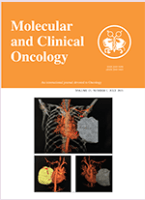
Molecular and Clinical Oncology
Connecting researchers to revolutionize cancer treatment.Molecular and Clinical Oncology is a dynamic journal published by SPANDIDOS PUBL LTD, aimed at advancing the understanding of cancer biology and treatment modalities. With an ISSN of 2049-9450 and an E-ISSN of 2049-9469, the journal serves as a critical platform for researchers and clinicians dedicated to uncovering novel insights in molecular oncology and enhancing clinical practices. As a testament to its growing influence, the journal has achieved a Q3 ranking in Oncology and a Q4 ranking in Cancer Research for the year 2023, reflecting its commitment to publishing high-quality research. Although currently not an Open Access publication, the journal offers crucial subscription options, ensuring comprehensive access to groundbreaking studies and innovations in the field. With converged years spanning 2018 to 2024, the journal is set to continue enriching the academic community with its valuable contributions, ultimately empowering researchers, professionals, and students engaged in the fight against cancer.

Clinical Medicine Insights-Oncology
Bridging gaps in cancer treatment and management.Clinical Medicine Insights-Oncology is a leading journal published by SAGE Publications Ltd, focusing on the interdisciplinary aspects of oncology. With an open access model since 2007, this journal fosters the dissemination of high-quality research and clinical insights that are crucial for advancing knowledge in cancer treatment and management. Based in New Zealand, it aims to bridge gaps in current oncology practices through the publication of innovative studies, case reports, and reviews. With a respectable ranking in Scopus at #264 out of 404 journals in the oncology category and belonging to the Q3 quartile, it positions itself as a valuable resource for oncologists, researchers, and students committed to enhancing patient outcomes. This journal strives to provide a platform for groundbreaking research that can impact clinical practice and inform policy within the field of oncology.
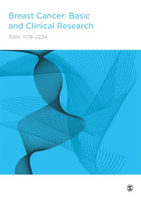
Breast Cancer-Basic and Clinical Research
Fostering collaboration for impactful research.Breast Cancer-Basic and Clinical Research is a premier open access journal published by SAGE Publications Ltd, dedicated to advancing the understanding and treatment of breast cancer through a comprehensive approach that integrates basic and clinical research findings. Since its inception in 2008, this journal has aimed to serve as a vital platform for researchers, healthcare professionals, and students in the fields of oncology and cancer research, providing them with timely access to significant new research, clinical trials, and innovative methodologies. With its current rankings placing it in the Q3 quartile for Cancer Research and Oncology, it reflects a steady commitment to quality and relevance, ranking #167/404 in Medicine - Oncology and #133/230 in Biochemistry, Genetics and Molecular Biology - Cancer Research as of 2023. The journal is designed to foster dialogue and collaboration across disciplines, enabling advancements in therapeutic strategies and patient care. Researchers and professionals will find it an invaluable resource as it continues to push the frontiers of knowledge in breast cancer research.

Translational Oncology
Transforming Cancer Insights into Clinical SolutionsTranslational Oncology is a premier open access journal published by Elsevier Science Inc, dedicated to the rapidly evolving field of cancer research and oncology. Since its inception in 2008, the journal has been a vital platform for the dissemination of innovative research and findings that bridge the gap between laboratory discoveries and clinical applications. With an impressive impact factor and ranked Q2 in Cancer Research and Q1 in Oncology, it occupies a prominent position in the academic landscape, helping to shape the future of cancer therapeutics and patient care. The journal offers valuable insights across a diverse array of topics, including molecular biology, genetic factors in cancer, and innovative treatment strategies, ensuring relevance and engagement for its readership. As it converges toward 2024, Translational Oncology continues to attract a global audience of researchers, healthcare professionals, and students committed to advancing our understanding of cancer and enhancing clinical outcomes.

Colorectal Cancer
Shaping the Future of Oncology and GastroenterologyColorectal Cancer is an esteemed academic journal published by Taylor & Francis Ltd, focusing on all aspects of colorectal cancer research, diagnosis, treatment, and prevention. With an ISSN of 1758-194X and an E-ISSN of 1758-1958, this journal serves as a critical platform for publishing innovative studies, clinical trials, and meta-analyses to advance the understanding of colorectal cancer. Though not yet categorized under open access, it provides valuable insights and is committed to enhancing the visibility of research contributions within the field. The journal aims to foster collaboration and communication among researchers, clinicians, and students dedicated to improving patient outcomes and exploring novel therapeutic strategies. With its rigorous editorial standards, Colorectal Cancer plays a pivotal role in shaping future research and clinical practices, making it indispensable for professionals in oncology, gastroenterology, and related fields.
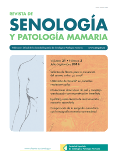
Revista de Senologia y Patologia Mamaria
Fostering innovation in obstetrics and gynecology.Revista de Senologia y Patologia Mamaria, published by ELSEVIER, serves as a vital resource for researchers and practitioners in the fields of obstetrics, gynecology, oncology, and radiology. With its ISSN 0214-1582 and E-ISSN 1578-1399, the journal's scope encompasses the latest advancements and multidisciplinary approaches to breast pathology and senology. Despite its current Q4 ranking across various categories, the journal continues to contribute significantly to the academic discourse, offering a platform for rigorous peer-reviewed articles, case studies, and clinical trials. Its ongoing commitment to distributing knowledge that advances the field is essential, especially given the increasing relevance of breast health in patient care. Situated in Spain with accessible research from 2012 to 2024, the journal invites contributions that further the understanding and treatment of breast-related diseases, making it an indispensable tool for students and healthcare professionals alike, eager to enhance their expertise in this specialized area.